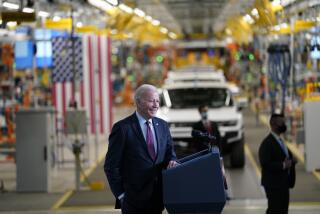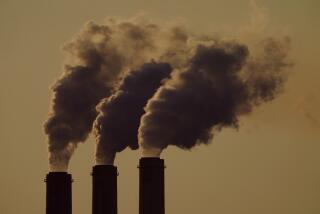A small step forward for Earth
In an election year, any progress on environmental regulation is cause for celebration. So when the Obama administration on Tuesday released its long-delayed proposal to limit greenhouse gas emissions from power plants, there was reason for anyone concerned about public health or the looming climate menace to cheer — even though it won’t shut down a single existing coal-fired plant.
Power plants are the nation’s biggest single source of greenhouse gas emissions. These gases reflect heat back toward the Earth rather than letting it escape into space; as a result, global average temperatures have risen by about 1 degree since 1880, according to NASA and the Environmental Protection Agency, and carbon emissions are expected to drive increasingly rapid warming. The EPA aims to slow the rise by barring new power plants from emitting more than 1,000 tons of carbon dioxide per megawatt of electricity generated. That rules out the construction of new coal-fired plants (unless they use an untested technology called “carbon capture and storage,” in which their emissions are pumped underground), because coal plants produce about 1,800 tons per megawatt. But all current plants, and any built within the next year, can continue to operate as usual and won’t have to do a thing to reduce their emissions.
The coal industry and its loyal servants in Congress are crying foul, and are pursuing a two-pronged strategy: seeking to pass legislation to block the proposed rule, and using it as political ammunition against President Obama by pretending it would kill jobs. Sen. James Inhofe (R-Okla.) has vowed to introduce a resolution to overturn the rule, while the pro-industry Institute for Energy Research calls it an “assault on American energy” that will push companies out of business by discouraging development of affordable coal power.
This ignores not only the damage being wrought on the environment by climate change and the related economic costs, but both legal and market reality. In 2007, the Supreme Court ruled that greenhouse gases were air pollutants covered by the Clean Air Act, and the EPA was obligated to regulate them if it found they endangered public health. Relying on the best available science, the agency made that finding two years later, meaning it’s now legally required to act. Forbidding new coal plants is a minimal step that is unlikely to have much impact on the energy market because the low price of natural gas is already rendering coal power uncompetitive; new gas-fired plants would meet the proposed EPA standard.
To really make a difference, the EPA should crack down on existing coal plants. But during an election year, when short-term economic concerns are trumping long-term ones, we’ll take what we can get.
More to Read
A cure for the common opinion
Get thought-provoking perspectives with our weekly newsletter.
You may occasionally receive promotional content from the Los Angeles Times.










